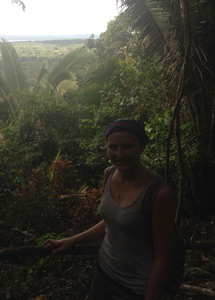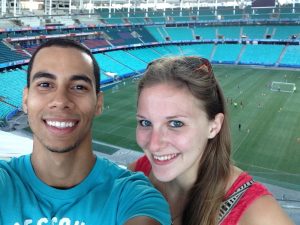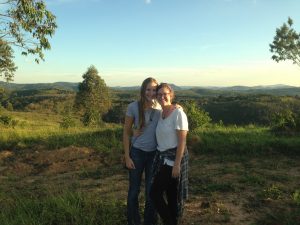
The only fight that you lose is that which you abandon
Not a day goes by where I don’t think of my summer study abroad in Brazil – either for the amazing people I came to know and love, the delicious food I tasted, the beautiful cities I explored, or just the adventure itself.
School has been in session for just over a month now and I have been able to tie in my Brazil experience to each one of my classes. In the Policy and Governance that I am a TA for, we were talking about Pope Francis’ recent visit to the United States and his concerns about capitalism, reminding me about our visits to the traditional communities of the Amazon Rainforest that do not live under a capitalist system. What a beautiful and inspiring lifestyle it was. At this point, not only did I feel a deep connection to the Pope, but also to all the students in my class.
My Sustainable Neighborhoods for Happiness course reminds me of our visit to Projeto Saúde and Alegria, or the Health and Happiness Project. This nonprofit works to develop programs in the areas of social and human rights, environment, health, education, and culture for traditional communities in the Amazon Rainforest. Although the community that we work with in Tempe is completely different, I learned how to talk to people about what makes them happy and sustainable, and this is what has stuck with me.

My Brazil experience carries beyond the classroom to my everyday life as well. Once I returned home, I stopped eating red meat. My friends and family are curious as to why, so I tell them of one particular memory in the Amazon. On one side was the beautiful rainforest, healthy and full. This area was an extractive reserve – protected forest that is sustainably harvested. On the other side of the road, everything was completely cut down, either for cattle grazing or soy plantations. This is an image I will never be able to get out of my head: the enormous contradiction, literally directly across the street. Not eating red meat is such a small life change that can make an enormous difference. More importantly, when I tell others this story they rethink their own behaviors. If not cutting out red meat entirely like myself, my friends and family have at the very least reduced their red meat consumption.
Moreover, I become more and more familiar with the unsustainable behaviors in my own life. Last week, I was very sick. I came home one night from a long day of classes and work and the only thing I needed was a hot shower. I spent about five minutes just sitting under the hot water and it felt amazing. And then I had a flash back to São Paulo. We stayed in a hotel that had a constant supply of hot water – which is extremely rare in São Paulo right now because of the severe water crisis. Most people’s water is completely turned off at 4 pm, sometimes even earlier. It was a rainy and cold day in São Paulo, and by the time we got back to our hotel that night, I needed a hot shower. Needed. I sat there for about five minutes in the hot water just warming up until I realized what exactly I was doing, and then I felt even worse than before. Although Arizona is not in the crisis that São Paulo is, water isn’t all too common. Last week, I looked up at my shower head, and it had written on there: 1.5 gallons per minute. I did the math in my head – after 10 minutes, I just wasted 15 gallons because I needed that hot shower to make myself feel better.


